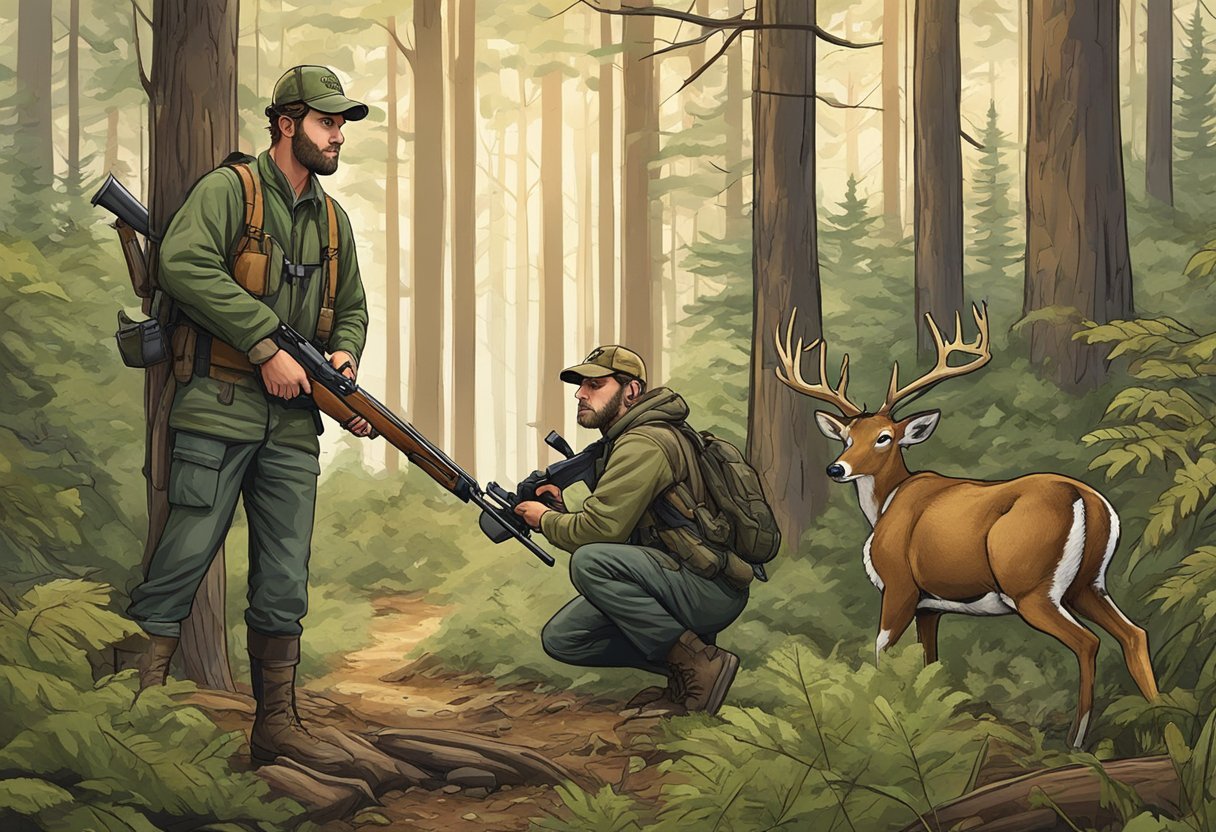Baiting deer in Pennsylvania is illegal during any deer season. The Pennsylvania Game Commission strictly enforces this regulation.
Understanding local hunting regulations is essential for maintaining a fair chase tradition and promoting wildlife conservation. Seasoned and novice hunters alike must adhere to the rules set forth by the Pennsylvania Game Commission to ensure a responsible and ethical hunting experience.
Baiting deer, which involves placing food or minerals to attract deer for an easier shot, can disrupt natural deer behavior and create unfair advantages. As such, hunters in Pennsylvania must rely on their skill, knowledge of deer habits, and ethical hunting practices to pursue game. This approach not only respects the wildlife but also preserves the integrity of the sport and the health of the ecosystem for future generations.
Navigating Pennsylvania’s Deer Baiting Regulations
Understanding the rules for deer baiting in Pennsylvania is crucial for hunters looking to stay on the right side of the law. Baiting deer, the act of using food to attract deer for hunting, is an area tightly regulated by the Pennsylvania Game Commission. This guide will clarify the complex regulations and ensure your hunting activities remain legal.
State Laws And Restrictions
In Pennsylvania, baiting deer is largely illegal on public and private land. The use of bait is prohibited when hunting within the state. The detailed laws include:
- No baiting in Disease Management Areas (DMAs)
- No feeding wildlife that could attract deer
- Bait includes grains, fruits, vegetables, nuts, hay, and salt
However, exceptions exist. For example, stands of natural vegetation, crops, and food placed as part of normal agricultural practices are not considered bait. Also, the use of urine-based deer lures is allowed, but only with proper certification.
Penalties For Illegal Baiting
Ignoring these regulations can lead to severe consequences. The penalties vary but typically include:
| Offense | Penalty |
|---|---|
| First Offense | Warning or small fine |
| Repeat Offenses | Increased fines and possible loss of hunting privileges |
Hunting over bait can also result in additional charges, like the confiscation of hunting gear and illegal harvest fees. Furthermore, any deer taken illegally may be seized by authorities.
Ethical Considerations In Deer Hunting
When hunters set out with bows or rifles for deer, ethics guide their steps. Ethical hunters respect the animal and the sport. They follow rules that ensure the hunt is fair and helps the environment.
Fair Chase Principles
Baiting deer alters the natural chase. This can impact the sport’s fairness. Hunters debate whether this practice honors traditional hunting values. To maintain fair chase:
- Avoid artificial advantages that reduce the deer’s chance of escape.
- Hunt in natural settings where deer can act freely.
- Respect wildlife laws, which often regulate baiting activities.
Wildlife Management Implications
Hunting aids in keeping deer populations in check. Thoughtful deer management helps forests and farms. However, baiting can disrupt natural behavior:
- Overcrowding: Bait sites can attract too many deer, which may harm local vegetation.
- Disease spread: High deer concentrations can increase disease risks, affecting entire herds.
- Ecological Impact: An unnatural concentration of deer affects other species and plant life.
Conscious hunters aim to protect the environment while engaging in their sport. Ethical hunting with these considerations maintains balance in nature.
Safe And Legal Alternatives To Baiting
For hunters in Pennsylvania, attracting deer can be a hectic task. But, worry not! Safe and legal methods are here. These methods keep the deer and the environment happy. Let’s dive into smart alternatives to baiting.
Food Plot Development
Creating a food plot is a fantastic way to attract deer. It provides deer with nutritious food options. Below are steps to develop a food plot:
- Choose the right location: Look for a spot with good soil and sunlight.
- Select suitable crops: Clover, alfalfa, and oats work well.
- Prepare the land: Clear debris and test the soil.
- Sow the seeds: Follow the guidelines for the chosen crops.
- Maintenance: Keep the plot healthy by weeding and watering.
Natural Habitat Enhancement
Improving the natural habitat is key to keeping deer around. Here are ways to enhance it:
- Water sources: Ensure there are clean water spots.
- Cover areas: Deer need places to hide and rest.
- Native plants: Grow plants that naturally provide food and shelter.
- Conservation: Maintain the land to support wildlife.
| Method | Benefits |
|---|---|
| Food Plot | Controlled food source, attracts deer, helps growth |
| Habitat Enhancement | Mimics natural environment, provides cover, sustains various species |
Choose either of these methods for a responsible hunting experience. Begin preparations early for the best results.

Credit: discover.texasrealfood.com
Effective Deer Attraction Without Bait
Effective Deer Attraction Without Bait in Pennsylvania involves understanding deer behavior and using natural strategies. Hunters can attract deer using knowledge of their habits. No bait means no risk of breaking local laws. Let’s explore how to draw in deer without the use of food baits.
Seasonal Deer Patterns
Knowing when deer move is key to success. Deer change their behavior with seasons. In spring and summer, they search for fresh growth. In fall, they bulk up for winter. Hunters must match their strategies to these patterns.
- Spring: Look for new plants and water sources.
- Summer: Find shady spots and food-rich areas.
- Fall: Search along routes to feeding zones.
- Winter: Track to sheltered bedding sites.
Scents And Calls Strategies
Deer use their noses and ears a lot. Mimicking natural scents and sounds can bring deer close.
| Strategy | Tools | Tips |
|---|---|---|
| Scents | Urine, Musk | Apply near your stand. Use sparingly. |
| Calls | Grunt Tubes, Doe Bleats | Match calls to season. Keep it natural. |
Use scent lures and calling techniques carefully. They should seem real to deer. Always follow local hunting regulations.
Expert Advice For Pennsylvania Hunters
Attention Pennsylvania hunters, mastering the skills of baiting deer is both an art and science. With careful planning and strategic execution, you can encourage deer to frequent your location. Yet, it’s crucial to stay updated with Pennsylvania’s hunting regulations to ensure your methods are both effective and legal.
Local Hunter Resources
Beginners and veterans alike need reliable information. Local hunter resources prove invaluable. They offer updates, tips, and community events. Connect with your fellow hunters at the nearest wildlife management area or check out the Pennsylvania Game Commission’s website.
- Hunter education courses: Build your skillset and knowledge.
- Hunting clubs and forums: Exchange tactics and experiences.
- Wildlife conservation events: Learn and support local ecosystems.
Staying Informed On Changing Laws
Laws and regulations about hunting change regularly. Ensure you do not miss any updates. Subscribe to newsletters from Pennsylvania Game Commission and join local hunting forums online.
| Resource | Description | Accessibility |
|---|---|---|
| Newsletters | Monthly updates | Online, Email |
| Forums | Daily discussions | Online, Members only |
| Social Media Groups | Real-time alerts | Online, Public |
Always cross-check your baiting strategies with the current laws to ensure you’re hunting responsibly and ethically. Remember, respecting wildlife management practices benefits everyone—hunters, wildlife, and the environment.

Credit: doingmoretoday.com

Credit: www.nytimes.com
Frequently Asked Questions For Baiting Deer In Pa
Is Baiting Deer Legal In Pennsylvania?
Baiting deer is illegal in Pennsylvania. The Pennsylvania Game Commission prohibits the use of bait to attract or take deer, as it can lead to unethical hunting practices and potential for disease transmission among wildlife populations.
What Are Legal Methods To Attract Deer In Pa?
In Pennsylvania, hunters can attract deer using natural attractants such as planting food plots or using deer urine scents. These methods are considered ethical and legal, aligning with the state’s wildlife management regulations.
Can You Use Mineral Blocks For Deer In Pa?
Using mineral blocks for deer in Pennsylvania is permissible for observation and photography purposes. However, it’s important to remove them well before the hunting season begins, as hunting over these attractants is against the law.
Are There Fines For Illegal Deer Baiting In Pa?
Yes, there are fines for illegal deer baiting in Pennsylvania. The exact amount can vary, but violators may face significant penalties including fines, hunting license suspension, and possible criminal charges, depending on the severity of the offense.
Conclusion
Understanding the regulations and ethical considerations for baiting deer in Pennsylvania is vital for hunters. By following legal guidelines, you can enjoy a successful and responsible hunting season. Remember, respecting wildlife and our hunting heritage remains crucial. Set out with knowledge, abide by the law, and happy hunting in PA.


